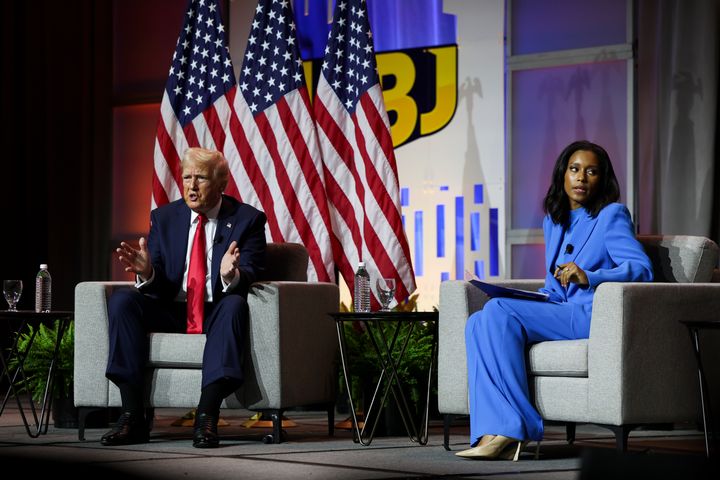Rep. Byron Donalds (R-Fla.) faced intense grilling on Sunday for refusing to condemn former President Donald Trump’s repeated questioning of Vice President Kamala Harris’ racial identity, at times even echoing the Republican presidential candidate’s racist talking points about the proudly biracial presumptive Democratic nominee.
Trump has been outwardly racist for decades now, but made headlines earlier this week after saying at an annual convention for Black journalists that Harris “happened to turn Black,” questioning how she could identify as both Indian American and Black. The former president has since doubled down on his comments that have now been adopted by his running mate and the far right, while other Republicans feel that their candidate should focus less on Harris’ racial identity and more on her policy positions.
Donalds, a Trump ally, tried multiple times to move on from questions regarding the GOP candidate’s comments without denouncing them during an interview on ABC’s “This Week.” But host George Stephanopoulos continued to press the congressman, who is Black, over why he could not simply say the former president’s questioning of Harris’ racial identity is wrong.
“This is really a phony controversy. I don’t really care, most people don’t,” Donalds said. “But if we’re going to be accurate, when Kamala Harris went into the United States Senate, it was AP that said she was the first Indian American United States senator. It was actually played up a lot when she came into the Senate.”
“Now she’s running nationally. Obviously, the campaign has shifted. They’re talking much more about her father’s heritage and her Black identity,” he continued before trying to pivot to what the Republican Party sees as the vice president’s policy failures.
The Associated Press reported at the time of Harris’ Senate win that she was the first Indian American to become a U.S. senator because it’s correct, with that specific historic milestone tied to her Indian American identity. The AP never implied that Harris’ Indian American identity negates her Black identity, and the vice president has always identified as mixed-race and a Black woman.
In response to his answer, Stephanopoulos reminded Donalds that he just repeated the racist questioning of Harris, referring to it for the remainder of the interview as a “slur.”
“If it doesn’t matter, why do you all keep questioning her identity?” the host asked. “She’s always identified as a Black woman. She is biracial. She has a Jamaican father and an Indian mother. She’s always identified as both. Why are you questioning that?”
Donalds questioned her identity again and claimed that there are a lot of social media users “trying to figure this out,” resulting in him and Stephanopoulos arguing with each other. Donalds then acknowledged Trump’s questioning of Harris’ identity during a rally in Atlanta on Saturday, trying to minimize the comments by claiming the GOP candidate only spoke about it for a couple of minutes.

“So questioning somebody’s racial identity for a couple of minutes is OK?” Stephanopoulos asked, to which the congressman claimed that none of Trump’s racism “matters to the American people.”
“I don’t understand why you and the president do it, but it’s clear you’re not going to say that it’s wrong,” Stephanopoulos said. “And you’ve now established that for our audience.”
During a roundtable discussion on “This Week,” Rachel Scott, ABC’s congressional correspondent who interviewed Trump when he made the racist comments at the convention for Black journalists, said that the former president “leaned into a territory that many Republicans were hoping that he would just flat out avoid, especially when it comes to questioning the racial identity, the heritage — especially in front of the National Association of Black Journalists — of Vice President Kamala Harris.”
Harris and her campaign have made it a point to not give too much air to the racist comments by Trump and his allies, calling him divisive and arguing that he is focusing on her identity because he is struggling to go after her based on actual policy issues.
“It has been really notable for us reporters who have picked up on the nuance about how she has responded to some of these attacks questioning her racial identity. She is not going there, and Democrats say, look, she knows who she is,” Scott said. “She identifies as a Black and Asian woman. Why does she have to go out there and respond in that sort of way?
“What she is doing is putting it back on Donald Trump and Republicans, saying they’re dividing, and then pivoting back to the issues,” Scott added.
Disclaimer: The copyright of this article belongs to the original author. Reposting this article is solely for the purpose of information dissemination and does not constitute any investment advice. If there is any infringement, please contact us immediately. We will make corrections or deletions as necessary. Thank you.
